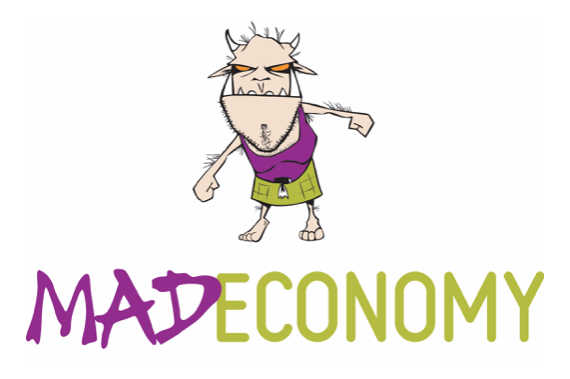
For a while my partner Ron Coleman had been thinking through the possibilities of creating a way of funding recovery projects outside of the mental health system, without grants, or any unneeded interference from “systems.” He came up with the idea of the mad economy.
Everyone in the world is either touched by their own mental health issues or have had a family member affected. What if they directed their buying power to an organization that would use the profits to fund exciting mental health & recovery projects both in the developing world and in their own countries? Projects that would be ethical, non-coercive, personal recovery-based, and were aimed at creating recovery communities like recovery houses, camps, festivals etc? What if they could buy products, crafts, services, art, music, books from people who had experienced mental health issues, enabling them to set up their own businesses or buy from social co-operatives that enabled distressed people to work and earn a living wage?
What is the mad economy?
Working to Recovery is pleased to announce that the soon-to-be-launched website MadEconomy.com will be coming to you through the ether very soon. MadEconomy.com is a web-based marketplace that has at its core the idea that collectively we can create a mad economy that benefits an often ignored group of people in our society. The mad economy is not a thing; rather the mad economy is made up of a community of interest, which in turn is made up of people.
Who is part of the mad economy?
One in four people will have a mental health diagnosis in their lifetime; the other three in four are probably family or friends of this group of diagnosed people, making the mad economy potentially the largest marketplace in the world, with everyone a potential member.
How will the mad economy work?
The mad economy site will operate in many ways like Amazon and E-Bay; the major difference will be that profits will be used to fund mental health projects that are recovery-based and outside of the system, and not go to shareholders. The projects will be new and innovative, and 50% of them will be in developing countries and 50% in the developed world. We are committed to funding 200 projects in our first two years.
When you go into the Mad Economy site you will enter via our homepage. This page acts as both a gateway into the marketplace, and a browsing point for news, information and blogs, as well as a place to leave comments or chat with other browsers. The home page will also be where buyers and sellers register for membership in the mad economy.
Membership is free, though donations are accepted, which will be used to develop mad projects. Once registered, people will be able to enter the marketplace and buy and sell or explore.
In the Mad Economy we will have different areas; there will be Mad News, Mad Blogs, Mad Info, Mad Talk; then in the marketplace there will be Mad Buy, Mad Sell, mad wants, ad ads, mad arts, mad crafts, mad books, mad music, mad jobs, mad services, mad love, mad accommodation, and there will be a section called Fairly Mad that will allow artists in developing countries to sell their wares at proper market rates; a bit like fair trade for mental health. There will also be an area on mad education, mad training, mad consultancy and mad therapists.
So what will happen next?
Over the next couple of months we need your help to start finding artists, authors, musicians, sellers and publishers who would be interested in using the site. That will help us begin the next phase of this work. We also want bloggers, news finders, and info diggers who will help create lively and interesting content. We cannot make this work without you because the mad economy is you. Let’s change the world!
Please share and fill in contact information on the website:
And join our Facebook page:
https://www.facebook.com/The-Mad-EconomyCom-521024894739688/timeline/















Karen,
This is a fantastic idea!
I would blog for you. My writing is already at: http://bpdtransformation.wordpress.com
I write about the pseudo-illness labeled Borderline Personality Disorder and how to heal borderline mental states. I can write about and other antipsychiatry topics. The one caveat is that I write under a pseudonym since I don’t wish my regular-world employer to know about my activism, as their knowing might be risky.
The Mad Recovery website is a great idea. Let me suggest a few resources that in America could be particularly valuable:
A database of peer mentors willing to communicate in various ways (email, phone, Skype, in person) with suffering “mad” people. Could be categories for free help and perhaps also for those charging a low fee (i.e. life coaches). Some might not like this but it’s undeniable that peer mentors being able to charge a low fee for their time would bring more people in.
A database of psychiatrists willing to work with people to taper off medications. Mad In America has some listed already but not nearly enough. If you don’t know him, contact Toby Tyler Watson (www.abcmedsfree.com) and ask him about his database of psychiatrists and mental health workers who support this approach.
A database of therapists willing to provide sliding-scale low-cost therapy to disadvantaged mad people. Perhaps mad people could enter their income level and find out what they would be have to pay / be able to afford to get psychotherapy. This would be subject to later income / tax return verification so that the system is not abused too much. This system could be attractive to young psychotherapists / trainees looking to get more experience of fill up their practice. . Check out http://www.ctvip.org/ for an innovative model of low-cost psychotherapy.
Regarding funding, here’s a good story about outside-the-system funding for something totally different but also analogous to your effort:
The late 1990s and early 2000s was a golden age for my beloved RPGs. These are Role-Playing Games, the type of computer games that brought Dungeons and Dragons to the PC, i.e. a game where you develop a character like a wizard or warrior and take them through a fantasy world fighting dragons and monsters. Games like Baldur’s Gate, Fallout, and Planescape Torment revolutionized computer role-playing.
However, by the mid 2000s, game development studios stopped producing these games because they found more profit in violent, less story intensive games like Halo and Call of Duty. Hardcore RPG gamers were outraged but couldn’t do anything to stop the trend. Until recently. Finally, disaffected programmers at a development studio decided to put an idea on Kickstarter for a new modern RPG. They were astonished that within 1 year, individual gamers funded it to the tune of $4+ million. See here for the whole story:
http://pc.gamespy.com/pc/project-eternity/1226102p1.html
http://arstechnica.com/gaming/2012/09/project-eternitys-all-star-effort-to-revive-the-classic-pc-rpg/
http://www.eurogamer.net/articles/2012-10-17-a-project-eternity-recap-what-USD4-million-has-funded
And the game is now available here – http://www.amazon.com/Obsidian-Entertainment-Pillars-Eternity-Download/dp/B00UXI36FU/
So if a small group of niche gamers could fund a $4 million game this easily, think what people involved in mental health could do for initiatives they wanted.
Here are two initiatives I think should be funded:
A major website linking those seeking peer support with those providing peer support for mental health problems. Could be broken down into many categories, like type of lived experience / “diagnosis”, mode of support offered (email, phone, Skype, in-person), free support, low cost paid / life-coaching support, etc. Imagine if you could go online in my city, Washington DC, and find a person with similar lived experience who would agree to meet with you for a set of 10 meetings in a coffee store, a library, or perhaps a more structured settign and talk with you about your psychotic experience, or your depression, or whatever.
Some major funding toward psychotherapy of psychotic states outside of the medical model. For example, what would it take to give 50 psychotic people labeled “schizophrenic” psychotherapy 3x a week for 3 years? Let’s do a crude back of the envelope calculation. Assume experienced psychotherapists would be willing to offer their services for 3-5 clients each, at a discount rate of $75 per session. Each psychotic client could then be given psychotherapy 3x a week, costing $11,700 a year or $35,100 for 3 years of psychotherapy. The cost to provide such services to 50 psychotic clients would be 1.75 million US dollars, and to 100 psychotic clients $3.5 million.
There would be additional costs to have a consultation psychiatrist, a study organizer, statisticans, etc, that might bring the cost to $2.5 million or $5 million in the 50-client and 100-client scenarios. In this type of approach, neuroleptics would not be mandatory and would only be provided if the client desired, with education on the risks involved before giving any drugs. The goal would be a low short-term use of neuroleptics, but it would be up to the client, family, and providers in each case working together to decide to use neuroleptics if at all.
If 25,000 individuals each donated $100, which should be doable on Kickstarter, such a program could be achieved at the 50-client level. The program would guarantee backers that the money would be used for psychotherapy of psychosis, or if the program didn’t come off, it would be returned. The point would be to demonstrate via various quality of life and functional outcome measures that low-medication psychotherapy of psychosis can be very effective and to be provide impetus for more funding and research. Ideally, there would be a comparison group of clients with similar demographics who would be given treatment as usual (i.e. neuroleptics, no psychotherapy). This could really undermine the drug approach to schizophrenia.
Much more in terms of organization and recruitment and planning would have to go into such a study, of course.
If anyone wants to work with me on a Kickstarter aimed at either of these two ideas, contact me at bpdtransformation (at) gmail (dot) com
Report comment
We are pleased to be hosting Ron and Karen again in Ashland, Ohio this Tuesday (Oct 27) for a ‘Hearing Voices’ training. I think they’re doing very important work and madeconomy.com is just the latest example.
Swing by and see Ron and Karen MIA readers if you’re in the area. Training info at http://www.ashlandmhrb.org/hearingvoices
David
Report comment
I might be interested, David, but when you go to the register for conference section, it says no registrations available.
Report comment
Just drop me your name at [email protected] and we will hold a spot!
Best,
David
Report comment
This is a great idea. 🙂
Report comment
Recovery and resilience are notions deeply embedded with both the economic and the social imperatives of contemporary neo-liberalism.
http://www.academia.edu/3366809/Introduction_The_Politics_of_Resilience_and_Recovery_in_Mental_Health_Care
I am not convinced that how ever well intended that “mad” as used by psychiatric survivors and the language of the market place sit easily with each other.
Just saying.
Report comment
I disagree with the transformation of shame to pride of “mental illness”. The treatment received by the “patient” after a psychiatric diagnosis creates a lifelong problem.
Social workers like to thank psychiatry for the Government disability payments from the medical paperwork psychiatrist submit, but neglect to recognize the hospital is a jail (without a trial), the psychiatric medicines given or forced are poisons that make people become their “diagnosis”. The family who believes the prediction create the bad future out of fear of the unknown future.
Intellectual disabilitiesy ( lack of intelligence) that prevents someone from having a job and holding on to the job can be recognized as the real reason for a Government disability cheque. To use “mental illness” as a reason comes with the baggage of psychiatric drug treatment.
If someone is reasonable and can be communicated with, they can no longer be called/named/judged “Mad”.
The organization of the “Mad” is contradictory and paradoxical.
Report comment
Thank-you. You said that better than I could have. While I can approve – up to a point – what’s being proposed here – there’s a major problem. It only reinforces the STIGMA, by “confirming” the “diagnosis”. It’s still a form of “victim blaming”….
It’s like starting a support group for rape victims.
“RAPE can BE FUN! ….”….
Hey LADIES, get your orgasm groove on with a RAPIST!”…..
….see what I mean?…..
“Mad-Economy” = just another form of finger pointing….and making $$$….
Report comment
Funny, when you imagine “recovery” starting with a slap on the rear. If it ends with shovelfuls of dirt, you may wonder what it was that was being “recovered”.
Yes, the “institutionalized”, formerly “institutionalized”, and mad, need a way into the economy. Is this that way? I can’t make a judgment over such a hypothetical matter. I would worry about it producing a further excess in “self-help” junk–fit fare for a ghetto full of “self-help” junkies. That said, I see a need for intentional communities supportive of ex-patients, and mad friendly communities, perhaps mad friendly enclaves within communities. Additionally, skill development and sources of income divorced from the “mental illness” system, and, with it, government maintenance of manufactured invalidism (hypnotic incapacity). Yes, contradicting mad ethos or no, we need to get people back into the workforce. There’s got to be money in that proposition somewhere I imagine. The idea that the world should be divided into mental health workers and their charges though leaves me cold. If this is about employing more and more patient/ex-patients as mental health workers. Excuse, please, the sign on your door reads, “out to lunch”.
Report comment
Thanks, Frank. I agree with what you say. See my other comments, above….
Report comment
That is a wonderful idea :). I’m on board.
Report comment
My recollection, from my research, is setting up ways of financially supporting each other is how the gay community helped garner strength within, so this sounds like a potentially great idea. But, as others mentioned above, many of the survivors of psychiatry get to the point they realize their “madness” was completely iatrogenic, so don’t necessarily want to identify as “mad” forever – especially once they’ve regained their sanity, by way of escaping from the defamatory, gas lighting, psychiatric stigmatizers and their toxic, torture drugs.
Perhaps a “survivor economy” or “psych drug survivor economy” may attract even more participants? I’ve met quite a few children / young adults who were drugged, escaped, and ended up in the work force, who are really disgusted by today’s psychiatric child drugging up system. But they don’t discuss the situation, unless they know you’re anti-drugging of children, then they talk, and talk, justifiably with great disgust. A survivor oriented, rather than, illness “mad” oriented economy might likely do even better?
Report comment
I’m in.
This fits exactly what I and a few others are trying to do.
No government funding, no grants, fueled by the desire to reach people.
Connecting with voices that aren’t part of the mainstream peer movement.
I’m in.
Report comment
Fantastic idea. I am in.
Report comment
Love the notion of a mad economy that is giving birth to R. D. Laing’s prophecy: If the human race survives, future men will, I suspect, look back on our enlightened epoch as a veritable Age of Darkness… They will see that what was considered ‘schizophrenic’ was one of the forms in which, often through quite ordinary people, the light began to break into our all-too-closed minds.
Which reminds me of my first dream of a world without money, after a fervent prayer to God, to give me a sign and show me what I should do with my life. Of course I didn’t expect a 3 decade involvement with the paternalistic modus operandi, of the developed world’s mental health systems and the delusion by which we exalt language above nature, to flow from that life challenging moment of fervent prayer.
Especially, the effort involved in understanding, in both body and mind, what R.D. Laing meant by: We are all in a post-hypnotic trance induced in early infancy. The self-deceiving seduction involved in words of communication with Self and Others (another of Laing’s insightful books) IS the reality of our motivation. A fleshy sense of self, which wonders if Mother Nature views us all, as terrorists, these days?
Keep up the great work Karen, although I do wonder about normalizing, recovery?
Report comment
Some folks enjoy their “Stockholm Syndrome” life of “madness” and psych drugs….
I’m NOT one of them. The LIES of the pseudo-science DRUG RACKET known as “psychiatry”
have done, and continue to do, far more harm than good…..
So, yes, have your little “mad-economy”….
I want no part of it. I find it disgusting, and counter-productive.
And sad. Very, very, very SAD….
May God have MERCY on us ALL…..
Report comment
Does this project still exist? I can’t get the site to load.
Report comment
Yes Julie, seems to be working here.
Report comment